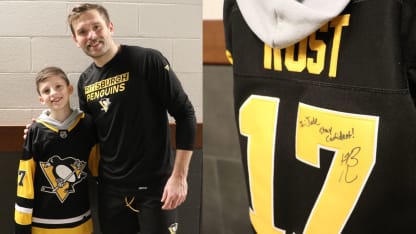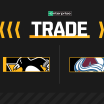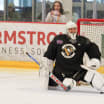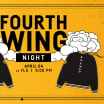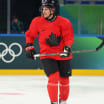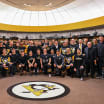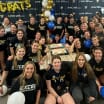Before the Ducks made Carlsson the second overall pick in the 2023 NHL Draft, Rust spoke to him over the phone. He offered advice on how to handle the media demands of the league, especially coming in as a top prospect from Sweden.
“I kind of ramped it up a bit through college, and then the American League into the pros. He was obviously a very high draft pick, so there were quite a few cameras on him,” Rust said. “He was kind of thrown into the fire a little bit more, and it's just like, hey, who cares? Just keep doing it. Keep talking. Just keep being you.”
Both players shared their stories with Liam Niel, a young Ducks fan from Friends, after Pittsburgh’s game in Anaheim last season. Despite getting hurt in a 5-1 loss, Rust still made his way over to the Ducks locker room to join Carlsson for a chat with Liam.
After making some small talk, Liam asked how their stutters affected them in school. Rust said that at first, he shied away from talking and reading in class. But his older brother Matt – who also stuttered – told Bryan to just embrace it, even if he had a hard time.
“As I got older, that's kind of what I did. Even if it was the worst day ever, I was like, okay, well, tomorrow's a new day,” Bryan told Liam. “I went out there and I just tried to get better and better and keep on doing it, and I was able to slowly get better.”
“That’s so cool,” Liam breathed.
“Basically, the same story for me, too,” said Leo, who also had a wonderful support system. “And talk slow. That was my problem when I was growing up. I talk super fast. Dad talked fast. Grandma talked fast. So, I think there's where I got it from. So, just got to slow it down a little bit.”
“Me too,” Rust agreed with a laugh. “My brain was always working faster than my mouth, and I struggled with it.”
Liam asked if they had been picked on because of their stutters. While Leo said he felt blessed in that regard, Bryan said he did face “a few bullies and a few unnecessary comments." That was tough to deal with at the time. But he learned to turn the other cheek, and on a couple of occasions, Matt stepped in with some choice words.
“But I think overall, I just tried to keep my head down and keep on working, keep on heading in the right direction,” Bryan said.
As a kid, Bryan would tag along to Matt’s speech therapy, observing and learning. That ended up paying future dividends for Bryan, as his own sessions weren’t quite as successful.
“Because every time I go, I would talk perfectly,” Bryan said with a chuckle. “The therapist would be like, I'm not really sure where to go, because there weren’t too many problems with our conversation. Then I'd get back in the car, and I would proceed to stutter and stumble every third word.”
So, Bryan just tried to apply the techniques he had seen Matt use, knowing he could do the work himself if he focused. What Bryan didn’t know was that he would end up with a career that required constant interviews, many of which were on camera. That’s a daunting prospect for anyone, but especially someone with a stutter.
After being taken by the Penguins in the third round of the 2010 NHL Draft, Rust headed to Notre Dame, and had strong junior and senior seasons. That meant he was talking a lot after games, and struggled with it.
“I've seen some old YouTube interviews that are... they're painful to watch, to be honest,” Rust said. “And I learned that it's just like, all right, well, okay. In certain situations, maybe take a deep breath, do this, this and this. Kind of little cues that I gave myself, that I knew that if I kept doing those things, that I would get better and better.”
Once he turned pro, Rust made the decision that he wasn’t going to let his stutter define him. He has never shied away from doing media. As Rust has grown into a team leader and member of the core, he has stepped up even more in that regard.
“I wasn't going to be the guy who was going to be different,” Rust said. “I wasn't going to let that define me as oh, this guy’s not going to do media because of this. No. He's just going to be one of the guys. And I think that went a long way. To me, just keep doing it. I think it’s just like anything else in your life. If you don't practice it, you're not going to get better.”
He hopes that it sets an example for the kids he meets through Friends.
“When you’re growing up, you can feel a little bit isolated if you have a speech impediment or if you stutter,” Rust said. “It’s something that can really hurt a kid’s confidence.
“So, when you’re able to see other people who suffer from similar things that you have to deal with and fight through similar adversities and try to deal with that on a day-to-day basis, I think that builds a bond. It says hey, other people can do this, these people are in my corner, they can help me, I can help them, these are people I can lean on.
“I think having that support system for all these kids and all these adults and everybody who’s involved is huge.”

